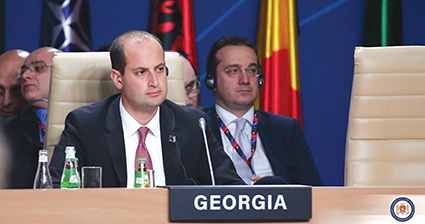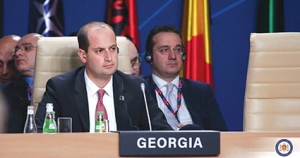NATO Warsaw Summit: Only a Minor Favor for Georgia?
On July 8-9 Warsaw hosted a NATO Summit that brought together 28 Alliance members to discuss the security challenges the Euro-Atlantic community faces. Georgia was invited as a loyal partner to the Alliance, who has done everything to become a member of the family but has yet to see its NATO dream come true.
The final declaration of the Summit reiterated the decision made at the 2008 Bucharest Summit that Georgia will become a member of NATO with the Membership Action Plan (MAP) as an integral part of the process. It also welcomed the significant progress realized since 2008. “Georgia’s relationship with the Alliance contains all the practical tools to prepare for eventual membership,” the document stated.
Interestingly, an important emphasis was given to this year’s parliamentary elections that “will be another key step towards the consolidation of democratic institutions.” In addition, NATO “highly appreciates Georgia’s significant and continuous contributions to the NATO Response Force and the Resolute Support Mission in Afghanistan and recognizes the sacrifices and contributions the Georgian people have made to our shared security.”
All the Alliance member states officially said that [they] will continue to provide the resources needed to strengthen Georgia’s capabilities and, thereby, help Georgia advance in its preparations for membership in the Alliance. The allies in particular will provide support to the development of Georgia’s air defense and air surveillance.
NATO stated that it does not recognize the so-called treaties signed between the Abkhazia region of Georgia and Russia in November 2014, and the South Ossetia region of Georgia and Russia in March 2015. “These violate Georgia’s sovereignty and territorial integrity and blatantly contradict the principles of international law, OSCE principles and Russia’s international commitments.”
Prior to the Summit, six major political parties in Georgia, including the Ruling Georgian Dream coalition and United National Movement, jointly addressed NATO that despite their substantial domestic political disagreements, they stand united on one principle: “Georgia is a sovereign, independent state, and the Georgian people are committed to building a European democracy that cherishes freedom, economic opportunity, and security, and aspires to full membership in all Euro-Atlantic institutions.”
Former Georgian Ambassadors to the US, Vasil Sikharulidze and Batu Kutelia, hoped for Georgia’s to become part of NATO’s wider Black Sea regional strategy with Ukraine, Bulgaria, Romania and Turkey. The NATO declaration only generally stated that the allies will also deepen their focus on security in the Black Sea region.
In their article on the Atlantic Council, US, the two ambassadors highlighted that Georgia’s NATO membership will put an end to uncertainty about the future of Georgia and, in turn, the future of Europe and its eastern flank.
US Army Colonel and a professor in the Department of National Security and Strategy at the US Army War College, Robert E. Hamilton, said that NATO’s declared policy that every country has the right to choose its own alliances, is untrue, referring to Georgia. He said that, having such a principle, in reality, Georgia would already be a NATO member, emphasizing Russia’s obstructive role in the process.
Hamilton believes that the US should consider guaranteeing Georgia’s security against external attack in this period between the announcement of Georgia’s invitation to join NATO and its actual accession into the Alliance. He calls the MAP process outdated as “Georgia has met all MAP requirements already.”
Summarizing the Summit results, James Stavridis, former NATO Supreme Allied Commander, currently the Dean of the Fletcher School of Law and Diplomacy at Tufts University, said that among other losers coming out of Warsaw are Ukraine and Georgia.
“Both have been invaded by the Russian Federation (Ukraine in 2014 and Georgia in 2008), and the Russians continue to occupy significant chunks of their territory,” the security expert said. “Given these disputes with Russia, the likelihood of full membership seems quite distant, and the Warsaw Summit did not offer much in the way of hope for their goals.”
Officials in Tbilisi, including Foreign Minister Mikheil Janelidze, underscored that Warsaw was a success as a sitting of the NATO-Georgia Council within the Summit was held for the first time and NATO reaffirmed its commitments toward Georgia and sent clear messages in terms of Georgia’s sovereignty and territorial integrity.
On the other hand, security experts in Georgia explain that while the Summit was not a failure for Georgia, it did not bring very much to a country that is facing fundamental security threats from Russia.
Opinions are also divided as to whether the Georgian government needs to carry out more proactive diplomacy and pursue more effective policies or if NATO should make a firm decision and open its door to the South Caucasian heartland. The answer can be two-fold: Georgia should do its best in terms of advancing further democratically, growing economically and becoming a more reliable partner for the western countries and the Alliance as a whole. On the other hand, NATO’s further expansion will probably much depend on the consequences of the forthcoming US elections and on geopolitical fluctuations on the old continent.
Zviad Adzinbaia












